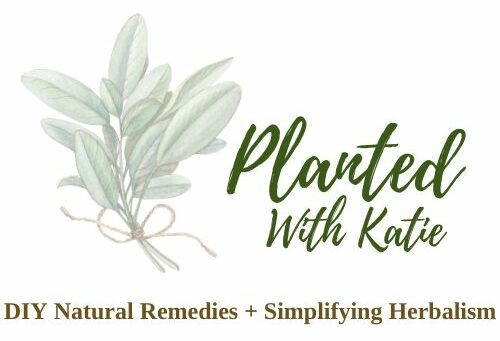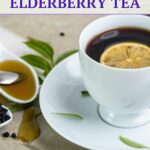7 Health Benefits of Elderberry Tea & How To Make It
The health benefits of elderberry tea make it a popular choice for natural wellness, especially during cold and flu season. Made from dried elderberries, this tea offers a tasty way to add powerful nutrients to your routine.

Disclaimer: This is not medical advice. Information and statements shown here are for educational and informational purposes only and are not to replace the advice of your healthcare professional.
This post may include affiliate links. Please refer to our disclaimer for full disclosure.
In this article, you’ll learn about the many ways elderberry tea can support your health, how to make it at home, and what to watch for in terms of side effects and safe use.
What is Elderberry Tea?
Elderberry tea is a popular herbal remedy brewed from dried elderberries, especially from the European black elderberry, or Sambucus nigra. Known for its deep, dark purple color and earthy, slightly tart flavor, elderberry tea has long been treasured in folk medicine across North America, Europe, and parts of Asia.

The elderberry plant, part of the Sambucus tree family, has been valued for centuries for its potential medicinal benefits. Native Americans, as well as early European and Asian cultures, used elderberries in teas, syrups, and tonics for immune support, respiratory health, and overall wellness.
This tea is rich in antioxidants and beneficial compounds like flavonoids and phenolic acids, which are believed to support immune health, reduce inflammation, and provide protection against cell damage.
Elderberry tea is especially popular for its immune-boosting properties, which can help fend off common colds, sinus congestion, and other seasonal illnesses. It is often enjoyed as a warm, soothing drink in the colder months, and it can be prepared with additional ingredients like honey, lemon, or ginger for added health benefits and flavor.
Why is Elderberry Tea Popular for Immunity?
Elderberry tea has long been valued for its immune-boosting properties, making it a go-to remedy during cold and flu season. The elderberry plant is rich in antioxidant compounds like phenolic acids, flavonoids, and anthocyanins, which work together to protect cells from damage caused by free radicals. This protection helps support immune function, allowing the body to respond more effectively to infections and inflammation.
Drinking elderberry tea or taking elderberry syrup may also help reduce the duration and severity of symptoms associated with upper respiratory infections, such as sore throat, nasal congestion, and sinus pressure. The immune-boosting effects of elderberry are so well-known that it has been widely used in folk medicine for centuries across North America and Europe to fight off common colds and respiratory issues.
For many, elderberry tea is not only an effective immune aid but also a delicious, soothing way to incorporate more antioxidants into their diet. Its warm, earthy flavor pairs well with additions like ginger and honey, making it easy to add to a daily routine as part of an overall strategy for better immune health.
Top 7 Health Benefits of Elderberry Tea
#1: Boosts the Immune System
Elderberry tea is a natural immune booster, especially popular during cold and flu season. It’s rich in vitamin C and antioxidants, including phenolic acids, which support immune health by protecting cells from damage.
A 2004 study published in the Journal of International Medical Research found that elderberry extract helped shorten flu symptoms in participants, reducing the illness duration by four days on average compared to a placebo group.
Elderberries, particularly the black elderberry variety, have been shown to stimulate immune function and may inhibit the activity of viruses, making elderberry tea a beneficial choice for enhancing immune health and fighting upper respiratory infections.
#2: Packed with Antioxidants
Elderberry tea is loaded with powerful antioxidants like flavonoids and anthocyanins, which give elderberries their dark purple color. These antioxidants help neutralize free radicals, unstable molecules that can cause oxidative stress and cellular damage.
A systematic review published in Phytotherapy Research highlights elderberry’s potent antioxidant compounds, which protect against cell damage and support overall health. Regularly consuming antioxidant-rich foods and beverages like elderberry tea may reduce the risk of chronic diseases, making it an excellent choice for long-term wellness.
#3: Supports Respiratory Health
Elderberry tea has been used for centuries in folk medicine to aid respiratory health, especially for conditions like nasal congestion, colds, and sore throats. The natural compounds in elderberries may help reduce mucus buildup and relieve nasal congestion, making breathing easier during respiratory infections.
A study in Complementary Therapies in Medicine reported that elderberry supplements reduced cold duration and improved respiratory symptoms in air travelers, suggesting a similar benefit when taken as tea. Drinking elderberry tea is a soothing way to support respiratory health and reduce symptoms of bronchitis and sinus infections.

#4: Anti-Inflammatory Properties
Elderberry tea’s rich antioxidant profile, particularly its phenolic acids, can help reduce inflammation. Chronic inflammation is linked to health issues such as arthritis and heart disease, so reducing inflammation is crucial for long-term health. Elderberries contain anti-inflammatory properties that work to calm the body’s inflammatory response.
A study in BMC Complementary and Alternative Medicine found that elderberry extract reduced inflammatory markers, highlighting its potential as a natural remedy for managing inflammation. Drinking elderberry tea may help the body cope with chronic inflammation, supporting overall wellness.
#5: Supports Heart Health
Elderberry tea offers cardiovascular benefits, largely due to its potassium and fiber content. Potassium is an essential mineral that helps relax blood vessels, which can lower blood pressure and reduce strain on the heart. Additionally, the dietary fiber in elderberries may help reduce cholesterol levels, further supporting heart health.
Elderberries have also shown promise in reducing the risk of cardiovascular disease through their antioxidant activity. Research in Oxidative Medicine and Cellular Longevity suggests that elderberry’s antioxidant compounds may protect blood vessels and reduce oxidative stress, making elderberry tea a great choice for cardiovascular health.
#6: Aids Digestion
Elderberry tea is known for its gentle laxative effects, which can help relieve constipation and support a healthy digestive system. Drinking elderberry tea can also soothe the digestive tract, reducing bloating and calming an upset stomach.
Elderberries contain dietary fiber, which promotes regular bowel movements, and their antioxidant properties may also support digestive health. Research in Nutrients discusses elderberry’s potential to support the digestive system by encouraging healthy gut bacteria, making elderberry tea a valuable natural remedy for digestive comfort.
#7: Promotes Skin Health
Elderberry tea is beneficial for skin health due to its high antioxidant and anti-inflammatory properties. Antioxidants in elderberries help protect the skin from oxidative stress, which can cause aging signs like wrinkles and sagging skin.
A 2017 review in Antioxidants highlights the skin-protecting properties of antioxidants found in elderberries, which help maintain skin elasticity and reduce cell damage. Elderberry tea may also help reduce acne and redness, thanks to its anti-inflammatory properties. Drinking elderberry tea regularly can give the skin a natural glow and support a more youthful appearance.
Side Effects & Risks of Elderberry Tea
While elderberry tea is generally safe and enjoyed by many, there are some important things to know about its side effects and risks.
1. Raw Elderberries Can Be Toxic
Elderberries contain natural compounds called cyanogenic glycosides, which can release cyanide if the berries are eaten raw. Always use dried or cooked elderberries, as these forms are safe to consume. Never eat raw elderberries, fresh berries, or other raw parts of the elderberry plant.
2. Possible Stomach Upset
Some people may experience mild stomach upset, especially if they drink elderberry tea in large amounts. This can include symptoms like nausea or diarrhea. Start with small amounts to see how your body responds.
3. Autoimmune Concerns
Elderberry has immune-boosting properties that may overstimulate the immune system in people with autoimmune diseases. If you have an autoimmune condition, talk to a healthcare provider before adding elderberry tea or elderberry supplements to your routine.
4. Blood Sugar Effects
Elderberry can impact blood sugar levels, so if you have diabetes or are managing blood sugar, it’s best to consult your healthcare provider before drinking elderberry tea regularly.
5. Drug Interactions
Elderberry may interact with certain medications, especially those that suppress the immune system. If you’re taking medications or have a health condition, it’s wise to check with a healthcare provider to make sure elderberry tea is safe for you.
Elderberry tea is a delicious way to support immune health and overall wellness, but it’s important to use it safely.

How to Make Elderberry Tea
Here’s a simple recipe to make elderberry tea using dried elderberries. You can add extras like ginger, honey, or lemon for extra health benefits and a boost in flavor!
Ingredients
- 4-6 cups water
- 1 tablespoon dried elderberries
- Optional: 1 small slice of fresh ginger, honey, or a squeeze of lemon
Instructions
- Boil the Water: Bring 5-6 cups of water to a boil.
- Add Elderberries: Add the dried elderberries (and ginger, if using) to the boiling water.
- Simmer: Reduce heat and let the mixture simmer for about 10-15 minutes to release the elderberries’ flavors and benefits.
- Strain and Serve: Strain the tea into a cup, removing the elderberries and ginger.
- Optional Additions: Add honey for sweetness or a squeeze of lemon for extra flavor and vitamin C.
Enjoy your elderberry tea warm for a soothing, immune-supporting drink!

How to Make Elderberry Tea
Ingredients
- 4-6 cups water
- 1 tablespoon dried elderberries
- Optional: 1 small slice of fresh ginger honey, or a squeeze of lemon
Instructions
- Boil the Water: Bring 5-6 cups of water to a boil.
- Add Elderberries: Add the dried elderberries (and ginger, if using) to the boiling water.
- Simmer: Reduce heat and let the mixture simmer for about 10-15 minutes to release the elderberries’ flavors and benefits.
- Strain and Serve: Strain the tea into a cup, removing the elderberries and ginger.
Notes
Conclusion
Elderberry tea is a simple yet powerful way to support your health. From boosting the immune system and aiding digestion to promoting heart and skin health, elderberry tea offers a wide range of benefits backed by traditional use and antioxidant properties. Adding elderberry tea to your daily routine can be a delicious and easy way to enhance overall wellness.
I invite you to give elderberry tea a try! Enjoy it warm with your favorite add-ins, and let us know your experience in the comments—whether it’s for immune support, digestion, or just for the enjoyable, earthy flavor. We’d love to hear how elderberry tea works for you!
Sources
- Journal of International Medical Research. “Randomized study on the efficacy and safety of oral elderberry extract in the treatment of influenza A and B virus infections.” 2004.
- Phytotherapy Research. “Systematic review of elderberry’s antioxidant and antiviral properties in respiratory illnesses.”
- Complementary Therapies in Medicine. “Elderberry supplementation reduces cold duration and symptoms in air travelers.” 2016.
- BMC Complementary and Alternative Medicine. “Anti-inflammatory effects of elderberry in cellular models.” 2017.
- Oxidative Medicine and Cellular Longevity. “Protective effects of elderberry against oxidative stress and vascular inflammation.”
- Nutrients. “Potential role of elderberry in digestive health and gut microbiome support.” 2018.
- Antioxidants. “Elderberry-derived antioxidants and their benefits for skin health and anti-aging.” 2017.



